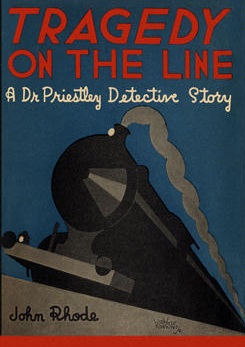 Gervase Wickenden was a man fascinated by crime. His library was full of details of real criminal cases and he frequently discussed them with his solicitor, along with his other obsession, psychic phenomena. How odd that Wickenden may have been the victim of a real crime – possibly a perfect crime.
Gervase Wickenden was a man fascinated by crime. His library was full of details of real criminal cases and he frequently discussed them with his solicitor, along with his other obsession, psychic phenomena. How odd that Wickenden may have been the victim of a real crime – possibly a perfect crime.
For Wickenden was found by the nearby railway line, his head all but destroyed by a passing train. But he was hardly suicidal and was far too careful for it to be an accident, despite the coroner’s conclusion. And then there’s the issue of the missing wills… Luckily Superintendent Quillan has the resource of Dr Priestley to call upon – but can even the great scientist (and detective) find a murderer who seems to have killed without trace…
Well, this is a bit of an odd one and it’s going to be difficult to review it while being completely spoiler-free. But never let it be said that I shy away from a challenge. While I’m not going to review any plot details, there’s something about the structure of the novel that I do need to go into, so apologies if this gets nearer the line than usual.
For the majority of the book, it’s a bit of a cracker. There are questions aplenty concerning the mechanics of the crime, with a couple of nice sections giving an idea of life in a small railway station. There’s even a discussion about the outdated notion of the organisation of the national police force, now that the time it takes to traverse the country is becoming shorter and shorter, meaning less regionality is necessary. It’s also the first time Rhode uses a train as a murder weapon, a method he will (and I will) return to with Dead On The Track twelve years and twenty six Priestley books later…
There’s a good set of suspects as well – Wickenden had a good collection of nieces and nephews (and spouses) who may or may not be heirs to one or the other missing wills. Priestley finds a new development that proves murder did occur and then Superintendent Hanslet turns up to spend most of his time theorising about conspiracies, none of which seem that believable, despite fitting the facts. There’s even a section, just as the reader starts to consider the unrecognizability of the corpse and the fact that one of the suspects is actually missing, Priestley decides to consider that possibility – just when you thought you were being clever…
But…
… I felt that Rhode messes up the finale. Not that the overall tale behind Wickenden’s murder isn’t a gripping one, and a fairly dark tale too, but the case isn’t really solved. Priestley discovers the truth when the killer has a touch of conscience, possibly due to being knocked over by a car, and decides to confess all. There’s no evidence at all that Priestley was on the verge of solving the case, so it seems odd that the reader should be expected to do so. But the deathbed confession is full of so much information that the reader was unaware of, including behaviour of the victim that seems opposite to what the reader has been told, that it feels like a massive cheat – like Rhode didn’t know how to finish his tale. So while the reader can guess the killer, there is really no way they can work it out. Yet it isn’t really sold as a case that can’t be solved…
It’s a shame, as it was going so well up to that point, and while it’s still a good read – this is the 11th Priestley novel from 1931, by the way – it’s just a shame about the end. Well Worth A Look, but there are better Rhode titles out there. Why not take a look at my reviews so far…

Yes, I totally agree with you on this one, the confession ending feels a cop-out, more a throwback to AC Doyle and the Victorian era, after what felt like one of his more Christie-esque milieus. An unusual book for him in one way though. All in all, I liked Dead on the Track quite a bit better.
LikeLike
Dead On The Track coming very soon. In fact, I started that one first, but when it referred back to this one, as you mentioned in Masters Of a the Humdrum Mystery, I switched books.
LikeLike
I always enjoy a review of another John Rhode book, particularly one I have not encountered as I’m reading quite a number of his works myself lately. Rhode is always interesting even when his work is flawed as this one seems to be and I thank you for your efforts.
LikeLike
I’ve liked most of the Dr Priestley novels I’ve read so far and I do love mysteries involving railways. I’d probably give this one a go even with its flaws although affordable copies seem to be impossible to find.
LikeLiked by 1 person
[…] Tragedy On The Line by John Rhode – 75% Excellent […]
LikeLike
[…] before is a clever idea or just Rhode recycling his Death By Train murder method (sort of) from Tragedy On The Line but it is a nice touch that Hanslet has his doubts because of what he almost missed that time. I […]
LikeLike
[…] for murder – Death On The Boat-Train and Death In The Tunnel – and as murder weapons – Tragedy On The Line and Dead On The Track – and there are many more examples. But the old-fashioned train, with its […]
LikeLike